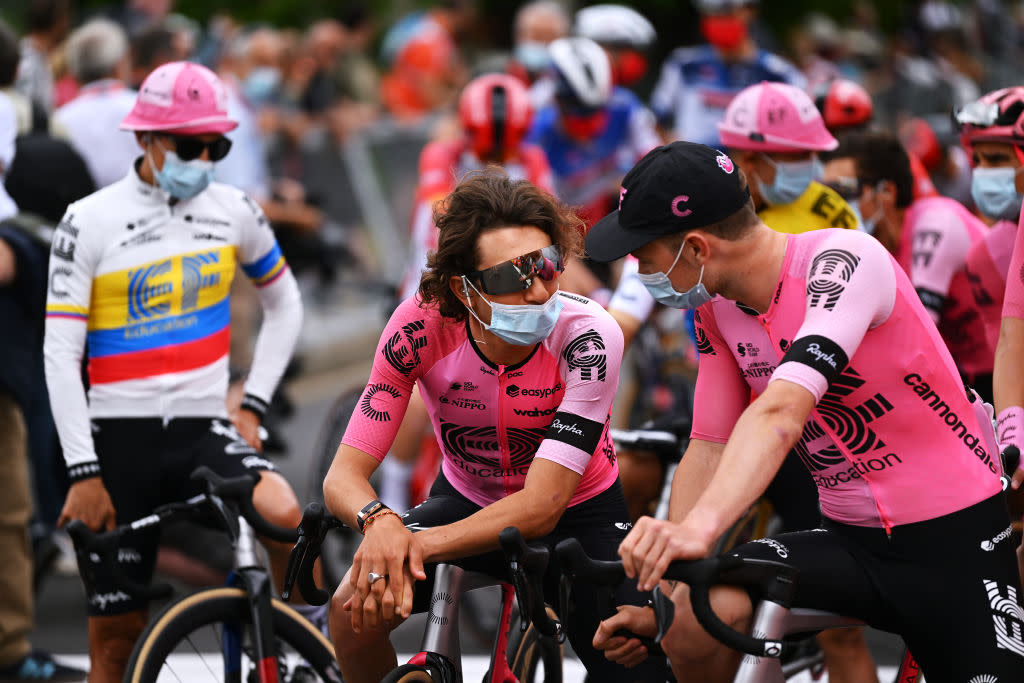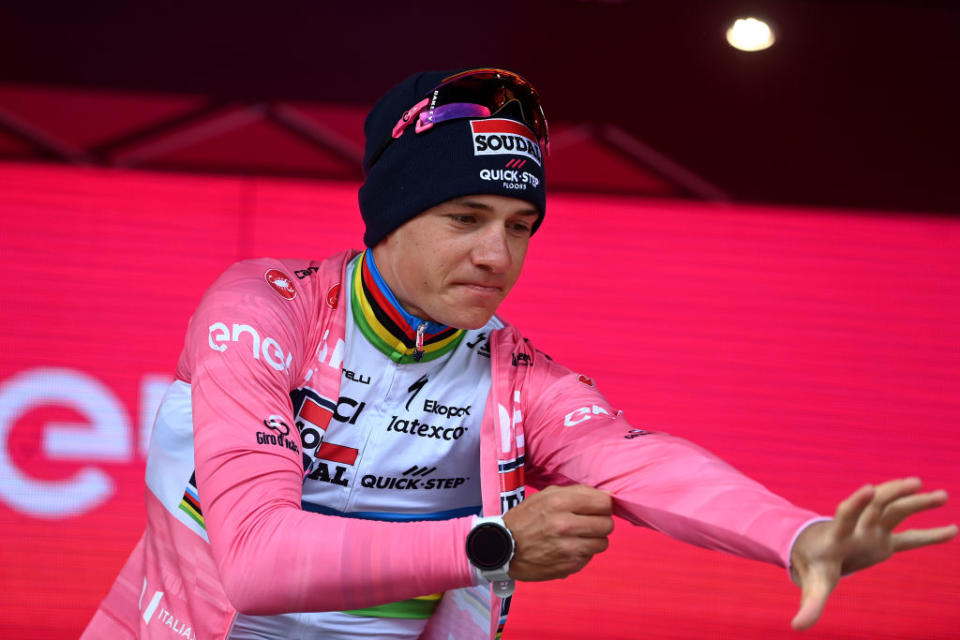Face masks and selfie bans return to limit COVID-19 in Tour de France peloton

- Oops!Something went wrong.Please try again later.
The Tour de France will again enforce a COVID-19 protocol in this year's race, with positive cases at the recent Giro d’Italia highlighting concerns that even while the pandemic is officially over, the virus can still have a major influence on races.
On May 5th 2023 the World Health Organisation declared that the COVID-19 pandemic was no longer a global health emergency. However, in the 2023 Giro d’Italia a spate of cases in the first half of the race, notably causing overall leader Remco Evenepoel (Soudal-QuickStep) to quit the race, heightened fears of the virus' ability to affect professional cycling.
In 2022, 16 riders abandoned the Tour after catching COVID-19 and five quit the race before it started for the same reason. There were 135 finishers last year, the lowest total since 2000.
The UCI and Tour de France organiser ASO have confirmed that for the fourth year running, masks and social distancing measures will be in force at the Tour de France, although not as strict as for the last three years.
As was already the case in 2022, riders will not automatically have to leave the race if they test positive, with a joint decision made by the UCI, ASO and the team involved after further testing. It is possible that riders can race on if they have a proven low viral load.
Read more
Tour de France 2023 - Comprehensive team-by-team guide
Face masks to return at Tour de France to limit COVID-19 cases in the peloton
How Bob Jungels started the 2022 Tour de France while positive for COVID-19
Remco Evenepoel out of Giro d'Italia following COVID-19 positive
A UCI press statement earlier this week underlined that the measures for the 2023 Tour were based on their 2023 anti-COVID protocol, which “has been regularly updated in line with the evolving health situation since it first came into force in 2020.”
The UCI pointed out that the health pass, vaccination certificate and negative COVID-19 tests prior to competition were no longer required by teams, UCI staff or organisers. It described the preventative measures “put in place by organisers Amaury Sport Organisation (ASO) – limited access and masks required in certain zones for the race convoy and followers - are in adequation with the UCI protocol.”
Rules for media and other race followers including the organisers and officials will be very similar to 2022, with masks required at the sign-on podium and in the team paddock, winners’ podium, while start and finishes lines and reduced access to riders. The goal is protect the riders, who will form protected bubbles within their teams.
Riders have been advised against posing for selfies with fans and signing autographs.
In early June a race document seen by Reuters said "Do not get too close to the spectators - Social distancing, no selfies, no autographs."
"For all the team members: Respect a confinement - Limit the interactions outside the race bubble. No eating out. Respect social distancing at the hotel.”
However, it has not been specified what the consequences will be, if any, if they disobey ASO's internal rules. There will be no specific rules for the public, although they are recommended to wear masks when near the riders.
“On the other hand, there will be no masks [for the riders] on the podium. We don’t want a complete contrast between us and everyday life,” Tour director Christian Prudhomme told AFP. “However, I regret that I won’t be able to shake a bike rider’s hand for the fourth straight year.”
The cost of COVID

In their press release, the UCI argued high vaccination coverage and what it claimed were increasingly mild infections were reasons for their protocol's easing of restrictions at the start of 2023. However, elsewhere, some riders, team officials and doctors have also pointed out that some COVID cases do remain serious.
AFP cited the cases of Arnaud Démare (Groupama-FDJ) and Simon Geschke (Cofidis) as riders who took several weeks to recover and Groupama-FDJ sports director Philippe Mauduit cited unnamed riders catching COVID who “never got their full level back, not even after three years. This is a demanding sport where the ‘matches’ last up to six and a half hours.”
In the recent Giro d’Italia, there were 18 abandons because of COVID-19, all of them in the first 11 stages and five of them from Soudal-QuickStep, including race leader Remco Evenepoel after stage 9.
“Once COVID gets in the peloton, and we’ve seen that in the Giro, it’s very difficult to stop because we spend all day breathing in other people’s air,” Thibaut Pinot (Groupama-FDJ), who won the Italian Grand Tour's mountains ranking, told AFP.
Back in May, Soudal-QuickStep manager Patrick Lefevere made a strong defence of Remco Evenepoel’s decision to abandon the Giro, saying on Twitter “‘It’s not a 9-5” job.
Lefevere was responding to Wielerflits journalist Raymond Kerckhoff’s comment on the same social media channel about whether riders should abandon if they have no or few COVID-19 symptoms.
Lefevere was categorical in his answer saying: “Yes, Raymond. You never know what’s going on under the skin [internally]. This is not a 9-5 job. Zero risk.”
Lefevere’s insistence that there should be no risks taken by teams when a rider tests positive was echoed in comments by long-standing Soudal-QuickStep doctor Yvon van Mol a few months ago.
L’Equipe quoted the team doctor as saying that COVID-19’s potential for leaving long-term effects and the lack of in-depth knowledge about it, given the virus recent appearance, meant that it was better to be safe than sorry.
“We don’t know the consequences for their cardiac system, and our job as doctors is to prevent riders with COVID-19 from racing,” he said.
“We don’t have enough of a [long-term] perspective to be sure that won’t have an effect on their health. It’s a precaution.”

